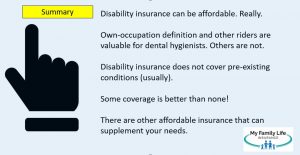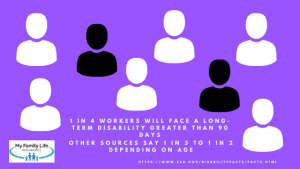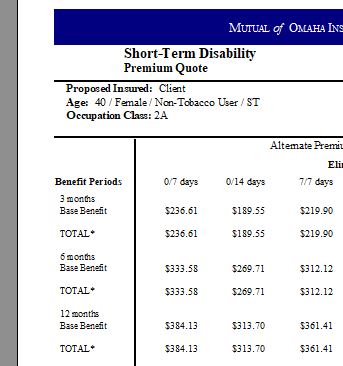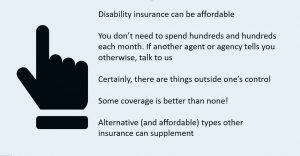Disability Insurance Guide For Dental Hygienists And Dental Assistants | We Discuss Underwriting, Plan Types, Cost, And The Best Options
Updated: April 12, 2024 at 9:40 am
 Dental hygienists or dental assistants probably don’t think of the importance of disability insurance. At least not right away.
Dental hygienists or dental assistants probably don’t think of the importance of disability insurance. At least not right away.
If you are a dental hygienist or assistant, you are busy! You spend your day providing important preventative care and other procedures. Moreover, you particularly enjoy how you help your patients maintain and improve their smiles! You rely on your technical skills as well as your physical ability to get the job done.
What if you could no longer do your job? Have you ever thought about that?
Have you ever thought about what would happen if you became sick, ill, injured, and disabled?
How would you pay the bills if you could not work?
These are all important questions that require answers. A disability affects the lifestyle you worked so hard for and your future plans.
In this article, we discuss disability insurance and the best disability insurance for dental hygienists and dental assistants.
Navigation And Summary
Here’s what we will talk about. Feel free to jump around as needed. I know time is precious, so here’s a summary of our article for your needs.
If you want to understand a particular topic in more detail, feel free to jump to that section or contact us.
- Why Do You Need Disability Insurance?
- Types Of Disability Insurance
- Here’s How Disability Insurance Protects Your Wealth
- Disability Insurance Underwriting
- The Makings Of A Strong Disability Insurance Policy
- The Best Disability Insurance
- Probable Disability Insurance Costs
- Final Thoughts About Disability Insurance
Let’s start by describing why you need disability insurance.
Why Do Dental Hygienists And Dental Assistants Need Disability Insurance?
The answer is simple, really.
Disability insurance helps pay your bills if you can’t work due to an illness or injury. Anything illness or injury-related that prevents you from doing your job as a dental hygienist or assistant is a disability.
In other words, if you will struggle to pay the bills (your mortgage, groceries, healthcare, etc.) upon a disability, you probably need disability insurance.
However, there’s more to it. Here’s the real reason you need disability insurance.
I’ll present this in a different way.
Your patients are certainly very important, right?
Yes, John, they are.
However, there is also a group of people who are more important. Who can be more important than my patients, you think. They pay the bills.
 True. They do, but they don’t love you as your family loves you. By far, if you have a family, your spouse and children rely on you more than you think. They love you more than anything. You wouldn’t want anything to happen to you that affects them, right?
True. They do, but they don’t love you as your family loves you. By far, if you have a family, your spouse and children rely on you more than you think. They love you more than anything. You wouldn’t want anything to happen to you that affects them, right?
There are tough questions that need answering.
Would you and your family be able to continue your standard of living without your income? If not, what changes can you make?
Would your spouse have to work or work more?
Would you need to sell your home to make ends meet? (No lie; some families have to.)
Who could be flexible with the children? Would you have the money to hire someone to take care of the kids?
The tough questions can go on and on.
Disability is a destroyer of dreams. Your future and family dreams could be destroyed. They don’t have to, though. With disability insurance, you have peace of mind knowing that you have a plan – and income – in place should the unexpected happen.
Yes, But A Disability Won’t Happen To Me
 I know. You think it won’t. However, the probability of having a long-term disability is anywhere between 1 in 3 and 1 in 4 workers. Contrast this to unexpected death, say from a motor vehicle accident, which is 1 in 114. Even dying from cancer has better odds: 1 in 7.
I know. You think it won’t. However, the probability of having a long-term disability is anywhere between 1 in 3 and 1 in 4 workers. Contrast this to unexpected death, say from a motor vehicle accident, which is 1 in 114. Even dying from cancer has better odds: 1 in 7.
But, John, I’m not going to get hurt or be in a wheelchair, you say.
How do you know? You don’t. Moreover, a disability usually isn’t from an accident. (Of course, though, it can.) A disability for a dental hygienist could be:
- Broken hand
- Cancer diagnosis
- Back injury
- Head injury
- Multiple sclerosis diagnosis
- Torn ACL
- Loss of eyesight
- Carpal tunnel
- Neck and back problems from repetitive motion
- A stroke
Naturally, when we think of disability, we think of someone bound in a wheelchair, right? Not true and far from it. According to the Council For Disability Awareness, 90% of disabilities are from illnesses (like cancer) and musculoskeletal issues than from accidents.
That means an illness or condition, such as cancer or a heart condition, has a higher probability of disabling you than a skiing accident.
Moreover, some dental hygienists and dental assistants develop lower arm, shoulder, and back problems. Depending on the severity, these situations can be long-term disabling conditions.
Ok, John, but I have workers’ compensation. I don’t need to worry about money. That’s great, I say. Did you know that work-related disabilities account for 5% of all disabilities? That makes sense, since 90% of disabilities are from illnesses.
While worker’s compensation can cover some medical bills and provide some money if you experience an injury at work, it may not totally cover your loss of income.
Again, what is your income plan if you can’t work?
The Types Of Disability Insurance Available
There are really 3 types of disability insurance available for dental hygienists and dental assistants.
The 3 disability insurances include:
- short-term disability insurance
- long-term disability insurance
- accident-only disability insurance
Many people ask us about the difference between short-term disability insurance and long-term disability insurance. Here’s the difference.
Short-term is for a disability of a short time period. Let’s say you break your hand. Well, it’ll be hard to work as a hygienist with a broken hand, right? So, that is a disability – you can’t do your job as a hygienist. How long does a broken hand heal? Two to 3 weeks? Once you’ve met the waiting period, you’ll be eligible for benefits and receive some disability benefits.
Long-term becomes the life-saver for those disabilities that last longer than 3 months. Cancer… a catastrophic injury…ALS…Diabetes…you name it. Most families can get by financially when one member has a short-term disability. Sure, it might be tough, but families can get by. It’s a long-term disability that can financially ruin families.
Both insurances generally use the own-occupation definition of disability. (More on that in a minute.)
Finally, there is accident-only disability insurance. Think of this as a “last resort” disability insurance. It pays a benefit due to an accident. The better carriers offer coverage for both on and off-the-job injuries. Usually, there are no health questions. Most accident-only disability insurance is affordable. The reason, as we stated earlier, is that most disabilities do not involve accidents.
In this article, we focus on long-term disability insurance. However, you can contact us with any questions about short-term disability or accident-only disability insurance.
What About Short-Term Disability Insurance For Dental Hygienists?
We receive many inquiries from dental hygienists and dental assistants wanting short-term disability insurance coverage.
Honestly, you don’t need it. That might shock you. However, those who say you do, you should question their intention. We feel that short-term disability insurance isn’t worth the money.
What? Why do you think that, you ask?
Here’s Why
 For one, short-term disability insurance tends to cost a lot more. I mean a lot. Just look at this real quote for a dental hygienist. This quote is based on a $60,000 salary. Are you ready to spend $200 to $400 per month on short-term disability insurance? There’s a reason it costs so much. There are a lot more short-term claims. Spending a few hundred a month on short-term disability insurance is common. I am talking about individual coverage. Policies through your employer likely cost a lot less. Those can make more sense, but not individual coverage.
For one, short-term disability insurance tends to cost a lot more. I mean a lot. Just look at this real quote for a dental hygienist. This quote is based on a $60,000 salary. Are you ready to spend $200 to $400 per month on short-term disability insurance? There’s a reason it costs so much. There are a lot more short-term claims. Spending a few hundred a month on short-term disability insurance is common. I am talking about individual coverage. Policies through your employer likely cost a lot less. Those can make more sense, but not individual coverage.
Second, short-term disability insurance covers disabilities of a short-term, maybe a couple of weeks to a couple of months. Then, the carrier stops paying.
However, there’s another favorable option that covers dental hygienists. Do you know what that is?
If you said, emergency savings, you are right.
Saving a few months of expenses proves advantageous. Do you see why? You won’t spend needlessly on short-term disability insurance. You already have the money for your short-term needs. It’s more important to have long-term disability insurance as those long-term disability situations place more financial pressure on families.
What about pregnancy? We described in our article that you could spend more on premiums than receive as a benefit. Yet, these other agents won’t discuss that or these alternatives. They’ll confirm you need it because you think you need it.
If you want some insurance for childbirth, pregnancy, or maternity leave, we discuss affordable options as well. We have helped many hygienists obtain pregnancy or maternity leave insurance.
If you can obtain short-term disability insurance through your employer, then it likely makes financial sense. However, having an emergency fund for these short-term situations is the right solution.
How Disability Insurance Protects Dental Hygienists’ And Dental Assistants’ Wealth
Sure, you’ve heard that disability insurance is paycheck protection. We discussed that earlier in the article.
Additionally, you know how it will pay a benefit to support you and your family if you can’t do your job due to illness or injury.
However, have you ever thought about how disability insurance protects your wealth?
Protecting your wealth is pretty important, right?
No, John. No one has ever discussed this. I’d like to learn more.
As a CFP® Professional, I routinely have discussions about how disability insurance protects your wealth as well.
According to the Bureau of Labor Statistics, dental hygienists earn, on average, about $78,000 gross annually. Let’s average that to $6,500 monthly.
What if you were disabled for 2 years (24 months)? What would happen financially?
Well, you would lose $156,000 of gross wages over that 2-year period (24 X $6,500).
Where would that money come from to pay $156,000 over those 2 years?
This is why I asked all those questions at the beginning of the article. In order to replace $156,000, would your spouse have to work more? If so, what gives? (The kids, the house…something has to.)
Now, disability insurance isn’t designed to replace all of your gross salary. It’ll replace about 60% of it. Why? For one thing, you aren’t paying tax on that disability benefit.
So, disability insurance will help pay for the mortgage, groceries, etc. However, what people don’t realize is that it has a huge, positive impact on protecting your wealth.
Why?
Well, people tell me they will raid their retirement accounts if faced with a disability. However, they don’t understand the financial consequences.
Doing so will have a huge, negative impact. Let’s illustrate that next.
Here Is How Dental Hygienists And Dental Assistants Protect Their Wealth With Disability Insurance
OK, first let’s assume you saved enough. Let’s also say you are a female dental hygienist, age 40, and make $80,000 gross or $60,000 after taxes and deductions. You have $75,000 saved through your 401k, and you contribute $500 each month to your 401k. Retirement for you is age 65.
You are suddenly disabled. However, you don’t have disability insurance.
So, gone is your monthly 401k contribution. But, you aren’t worried about that. Your main worry is money. You just need money to help pay the bills.
You turn to your retirement savings and request distributions from your 401k. These distributions are taxable and subject to a penalty.
Let’s compare how your 401k would look with and without a disability.
Assuming an 8% return, without a disability, you would have accumulated about $1,100,000 at age 65.
But, because you are disabled, you exhaust the $75,000. It’s gone. You are still disabled. Additionally, your spouse works more, and your relatives help with the kids. You take out a home equity loan to pay for things, too. Thankfully, the mortgage is paid. While you are grateful, however, it is a financial strain and stressful. It makes you worried.
After 2 years, you are back at work. You’ve used $120,000 ($5,000 per month) between your home equity loan and 401k. However, you are 2 years older. Moreover, you don’t have retirement savings anymore, so you start over.
You contribute $500 each month. At age 65, you have about $433,000!
Your wealth dropped because the $75,000 saved could not compound for another 25 years. Because it was gone.
Don’t forget that you have the home equity loan to pay back.
What do you think about this?
What Happens If You Had Disability Insurance?
If you had disability insurance, you would have been much better off.
Sure, you would not have contributed $500 each month for 2 years ($12,000).
 However, your investment still would have compounded those 2 years.
However, your investment still would have compounded those 2 years.
So, if you had disability insurance, you would have ended up with approximately $1,030,000 at age 65.
That is about $600,000 or wealth preserved.
What, you exclaim!
Yes, and remember…this is a 2-year disability. What if your disability was 5 years or more?
This is how disability insurance protects your wealth!
Additionally, when you factor in the cost, purchasing disability insurance becomes a “no-brainer”.
Disability Insurance Underwriting For Dental Hygienists And Dental Assistants
Underwriting for dental hygienists and dental assistants consists of 4 areas:
- your age
- income
- health conditions
- your occupation
Your age and income are straightforward. The older you are, the more expensive the policy will be.
The higher your income, the higher the benefit, and the higher the premium. Don’t worry about the actual premium. I’ll discuss that more when we talk about premiums below, and how we are different than other agencies.
In case you were not aware, your income is your W-2 gross salary if you are an employee. So, if your W-2 salary is $60,000, carriers use that number for underwriting. Carriers also like to look at the last 2 years or 3 years and average out. So, having the last 2 or 3 years of salary on hand is handy for the application process.
Let’s talk about health conditions and your occupation next. Disability insurance underwriting is a little more complicated than, say, that of life insurance.
Why Health Conditions Matter In Underwriting
To get right to the point, usually, carriers exclude pre-existing health conditions from coverage. For example, if you have a pin in your right wrist from breakage 5 years ago, your policy excludes coverage on that right wrist.
If you had complications of pregnancy, then the carrier excludes any complications of future pregnancies.
That’s just how disability insurance works. Remember, the carrier is underwriting your potential disability. So, it will (generally) exclude any health complications or injuries you’ve had in the past.
If you have more serious health conditions, the carrier could place a rating on your policy. A rating is an extra premium the carrier charges for an increased disability risk. Moreover, the carrier may limit options such as limited waiting periods or reduced benefit periods.
Having an exclusion or a rating is not a reason to ignore a disability insurance policy. There are nearly endless ways for a disability to occur.
We actually discuss many scenarios about disability insurance underwriting. Additionally, we illustrate why it is NOT advantageous to decline a policy with any exclusions. I am happy to say we have helped many professionals, including dental hygienists, remove exclusions from their policies.
Your Occupation Matters
 So, all the disability insurance carriers classify occupations. In general, the carriers classify from a 1 to a 5 or 6.
So, all the disability insurance carriers classify occupations. In general, the carriers classify from a 1 to a 5 or 6.
An occupation with a class 6 has the lowest occupational disability risk and class 1 has the highest. All things being equal, you’ll pay a higher premium if you are a class 1.
Disability insurance carriers usually classify dental hygienists and dental assistants as a 2 or a 3. In some cases, a higher classification may be available. For example, we have helped many dental hygienists obtain a class 5.
So, what does this have to do with dental hygienists?
Well, you do have the potential for a higher on-the-job disability compared to, say, an office manager. Carriers underwrite this by assigning your occupation a classification number.
While there is general alignment among the disability insurance carriers, some carriers elevate your classification higher. All things being equal, carriers with a higher occupation classification save you money with lower monthly premiums.
The Makings of A Solid Disability Insurance Policy For Dental Hygienists and Dental Assistants
Our goal when designing disability insurance plans for dental hygienists and dental assistants is the combination of value and premium. In our opinion, there are certain “non-negotiable” provisions with disability insurance.
The first is the own-occupation definition. Luckily, many carriers make this definition of disability available for the dental hygienist and assistant occupation.
The own-occupation definition means that the carriers pay a disability benefit if you can’t perform your own occupation as a hygienist or assistant. It pays even if your disability doesn’t prevent you from working in another job, say as a security guard. In other words, you can receive your disability benefit as a dental hygienist AND receive your earned income from the other job.
Another “non-negotiable” feature is partial disability benefits. You’ll want this. I’ve seen far too many policies without this important feature.
All this means is that the carriers pay you a partial benefit if you can work, but just not full-time. Many carriers offer this, but they have a stringent definition. We work with carriers that offer an easier definition for hygienists and assistants
Of course, you’ll want to insure the most income you can. If you are an employee, most carriers will insure 60% of your salary. For example, if you have a gross monthly salary of $5,000, you can cover up to $3,000 (60%).
But, what If your salary increases? Can you insure that salary increase?
Yes. That is where a guaranteed purchase option helps. This option allows you to purchase more disability insurance in the future as your salary grows. The advantage? You DO NOT have to go through underwriting again. How great is that?
Some Disability Insurance Policy Basics For Dental  Hygienists And Dental Assistants
Hygienists And Dental Assistants
There are several definitions and provisions you’ll need to understand about disability insurance to make an informed decision.
First is the elimination period, or waiting period. This is like a deductible.
It is the length of time that elapses before disability benefits begin. For example, if you select a 90 day elimination period, your eligibility begins on the 91st day. However, typically with carriers, you won’t receive your benefit until 30 days later (day 120 of disability or so). This means you need to have adequate savings to carry you and your family until benefits begin.
For long-term disability insurance, you can go as low as 30 days for a waiting period.
The second definition is the benefit period. The benefit period is the maximum time you receive your benefit for 1 claim. Disability benefit periods can be as low as 2 years and, with some carriers, as high as to age 67. The average disability lasts around 30 months. Therefore, a 5-year benefit period should be OK.
Optional Disability Insurance Riders
Riders customize your policy. Like a car, the more customization, the higher the cost.
You can add optional disability insurance riders at an additional cost to your policy to best fit your needs and budget. Some popular rider options for dental hygienists and dental assistants include:
Return of Premium Rider: If you never make a claim, the carrier returns the premiums you paid + interest. Note: this can be an expensive rider as it is based on age.
Retroactive Injury Benefit Rider: Pays benefits from the date of disability due to injury if disability occurs within 30 days of the injury and continues through the elimination period.
Activities of Daily Living Rider: This rider pays an additional benefit if you can’t perform two or more of the activities of daily living. Additionally, it will pay if you are cognitively impaired.
Residual Disability Rider: This rider will pay a benefit if you return to work in your occupation, and you experience an income loss of 20% or more compared to your pre-disability income. Usually, the amount of disability income you receive is a percentage of your total monthly disability benefit. For example, let’s say you return to work and experience a 40% income loss. If your monthly disability benefit is $4,000, you will receive $1,600 ($4,000 X 40%).
Here’s The Importance Of The Residual Disability Benefit Rider
Why would you need this rider? Most disability insurance policies allow partial disability benefits upon total disability first. This means if you are only partially disabled (i.e. you can still work but not full-time), you will not receive any benefits until you have met the carrier’s requirements for total disability first. But, you are partially disabled, not totally disabled. Ugh! So, no money for you!
Typically, this rider circumvents the total disability requirement and allows you to receive benefits immediately (after you satisfy the elimination period).
Here is a very easy example. You lose feeling in your wrists and fingers. The doctor says you need to rest and limits your work to 2 days per week. Because of the rider, the carrier pays you for 3 days missed. Without this rider – or a plan that has a partial benefit without a total disability requirement first – you would not receive any disability benefits because you are still working.
The Best Disability Insurance For Dental Hygienists and Dental Assistants
You are probably wondering who we like to work with. First, we work with many disability insurance carriers. So, we are sure we can find one that meets your needs and budget.
However, many carriers insure the dental hygienist occupation at occupational class 2. That proves expensive, all things being equal. Moreover, it also potentially limits your benefits.
The carriers we like classify the dental hygienist and assistant occupation at 3. Additionally, we work with a carrier that insures the occupation at a 5! Certain parameters have to be met. However, we have helped many dental hygienists save money this way.
Additionally, the carriers we like all have the:
- own-occupation definition
- partial disability benefits
- guaranteed purchase options
and additional options as discussed. The carriers we like also have solid, value-added benefits like re-training programs.
If you are Christian, we also work with a carrier dedicated to the Christian community. Even better, they classify the dental hygienist occupation at a class 3.
Contact us if you would like to learn more. We are happy to chat with you.
What About The Disability Insurance Plan From The ADHA?
The American Dental Hygienist Association (ADHA) offers a disability insurance plan to its members. Is it any good? Well, as we always say, some coverage is better than none. However, we feel other carriers offer better coverage. Why? Let’s discuss more.
The Hartford underwrites the ADHA plan. The Hartford underwrites a majority of association disability insurance plans. These plans are usually “plain vanilla” with no chance to customize to your specific situation.
It’s inexpensive, so that is good. But, peel the onion layers back, and you will see why.
First, it coordinates with social security disability. This means after (generally speaking) 6 months of total disability, the carrier forces you to apply for social security disability. If you receive any benefit from social security, The Hartford reduces your benefit accordingly.
Second, their partial disability benefit pays after total disability first. As we mentioned earlier, that stinks. What if you develop Multiple Sclerosis? That is a long-term partial disability situation. It could be years before you are actually totally disabled and receive a disability benefit. (I speak from experience as my Dad has the condition. He worked partially for years suffering from disease until finally totally disabled.) You might have a serious income loss without an appropriate partial disability benefit provision.
Finally, it has a 2 year own occupation only followed by any occupation.
It does have a pre-existing clause, which is favorable. However, you still have to go through underwriting. Keep in mind, if you are disabled because a lower-arm issue, for example, the carrier likely won’t approve your disability long-term. This is because of the any occupation definition.
Premium Cost Of Disability Insurance
Of course, premiums matter. The good news is disability insurance is easily customizable to your needs and budget. Depending on your health and riders, the premiums could run anywhere from $1.00/day to $3.00/day, or more. Do you think that it is expensive? I bet you buy coffee almost everyday or your lunch. What is more important? Insuring your income or buying a cup of coffee? There are many ways to afford disability insurance.
Here’s another way to look at it:
Disability insurance will generally cost 2 cents for every $1 you make. Think about that.
We at My Family Life Insurance try to keep our client’s premiums below $100 per month. Nearly all of the time, we accomplish that. You can easily customize a comprehensive policy for less than $100. Honestly, I think we might be the only agency that aims for that. The reason is we know you have other things to spend and save (like your retirement).
However, there are some characteristics outside one’s control. Remember, that disability insurance is based on 4 factors:
- your age
- occupation
- health
- income insured
You can’t change your age, and you can’t necessarily change your occupation. You can change your health…to a point. If you have type 2 diabetes, for instance, nearly all carriers will increase your premiums to compensate for the increased disability risk. Remember, we discuss that most disabilities are from disease and illness rather than accidents.
Nevertheless, we can structure a plan that protects you and your family, while meeting your needs and budget. We’ve helped many clients this way, and I am sure we can help you, too.
Now You Know Dental Hygienists And Dental Assistants Can Obtain Disability Insurance
We hope now you have a solid idea of why dental hygienists and dental assistants need disability insurance. Confused? Don’t feel that way. We’re here to help educate you and protect your income and future. Don’t know where to start?
Use this disability insurance needs analysis worksheet. Follow the instructions; it is rather easy to fill out (we at My Family Life Insurance try to make understanding insurance easy). Next, feel free to reach out to us for our assistance or a quote. Or, use the form below. We only work for you, your family, and your best interests only. We have helped many dental hygienists and dental assistants secure the right disability insurance for their specific situation, giving them and their families peace of mind.
Learn More
Are you interested in learning more about the information in this article? Please fill out the form below, and we will email you additional information or give you a call. We always work in your best interest. By entering your information, you are providing your express consent that My Family Life Insurance may contact you via e-mails, SMS, phone calls, or prerecorded messages at any phone number(s) that you provide, even if the number is a wireless number or on any federal or state do-not-call list. Additionally, you understand that calls may be placed using automated technology, and that consent is not a requirement for purchase. Your information will NOT be sold and will remain private. However, you may opt out at any time. We respect your privacy first and foremost. By contacting us, you agree to receive text messages from our number (800) 645-9841. If you no longer wish to receive text messages, you may opt out at any time by replying "STOP".
2 thoughts on “Disability Insurance Guide For Dental Hygienists And Dental Assistants | We Discuss Underwriting, Plan Types, Cost, And The Best Options”
Comments are closed.
Hi . I live in California and I am a dental hygienist . I’m curious about your long term true own occupation policy . I have one / but it’s own occupation for only 2 years . Just curious what my cost would be through you guys and see what kind of coverage you offer
Hi Christine,
Yes, we have a plan that offers a “true” own occupation definition through the benefit period, for California residents. I will email you directly with more information.
John